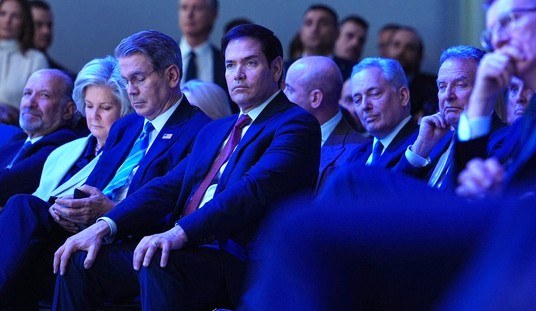Easter has passed, one of the most sacred days on the Christian calendar. So, it’s back to the grind and religious things fade into the background as the noise of real-life drowns out the celestial. Besides, what do the events of two thousand years ago have to do with today? The Constitution is a little over two hundred years old, and the ideas of those dead white men seem anachronistic.
If you entertain those kinds of thoughts, you’re not alone. One of Jesus’s original twelve disciples, Thomas, felt very much the same way just days after Christ’s resurrection. He missed the resurrection events and missed Christ’s first appearance to His disciples. The Gospel of John tells us, “But Thomas, one of the twelve, called Didymus, was not with them when Jesus came.” (John 20:24)
Thomas is usually known as Doubting Thomas, because he famously declared “Except I shall see in his hands the print of the nails, and put my finger into the print of the nails, and thrust my hand into his side, I will not believe.” (John 20:25) Today, we’d call him an empiricist or skeptic. He would have been a great devotee of the scientific method. But had he applied his empiricism consistently, he’d have come to a very different conclusion. Thomas witnessed the miraculous power of the Son of God firsthand. The blind were given sight and the ability to instantly understand what they saw; the deaf were given the ability to hear and immediately comprehend speech. Those that were lame from birth instantly rose and walked without so much as a stumble. The sick were made whole. Demonic possession was broken, and the dead were raised from the tomb.
But we shouldn’t be too hard on Thomas—we’re presented with the miraculous and are just as inconsistent. Most of it is right under our noses or over our heads. It’s a fact that science cannot explain consciousness or conscience. Conscience is a puzzle. You cannot control it or dictate its directives. If you could, you’d never feel guilty about anything. Nor is it a social construct. Totalitarian regimes have tried and failed to reprogram human nature, but an innate conscience and religious impulse always reasserts itself. (Romans 2:15) Consciousness is an even tougher nut to crack. How does sentience arise from inert matter? If a bomb is detonated in a junkyard, does a Boeing 747 emerge from the chaos? When we experience nothing but fully formed, distinct species in nature and in the fossil record, how does an evolutionary process make sense?
Recommended
The cosmos contains space so vast we cannot comprehend it. Andromeda is our closest galactic neighbor at two million light-years. This means if you could travel at the speed of light, a theoretical impossibility if Einstein’s physics are correct, it would take you two million years to travel there. All the proof for eternality and omnipotence is held in the impossibility and infinitude of the universe. Our science is so small we still can’t explain gravity. In light of the vastness, complexity, and intricate detail of creation, our hubris is laughable. That’s the problem with empiricism, it confines us in a prison constructed of our own fallible senses, and remakes us in the image of the infernal—meat and chemical composition.
Thomas missed the “real real.” Truth that is extrinsic to ourselves and more true than our perceptions and biases. Without the Word, the Logos, the ultimate referent, we lose all meaning not just morally, but linguistically, and science becomes the raving of madmen. It’s easy to see the erosion of meaning in language. For instance, “transgender” isn’t a real word. It describes a state of being that does not exist in this universe. We all know it, but intimidation and fear predominate, so most just go along to get along without the vigor of truth to challenge the lie.
But here’s the catch—before you can comprehend what is real you must possess faith in the One who is truth. Thomas denied the reality of Christ’s resurrection until he was presented with the reality of Christ—“then came Jesus.” (John 20:26) Christ must present himself to you and he does so with rational evidences.
God says to each of us, “Come now, and let us reason together, saith the LORD, though your sins be as scarlet, they shall be white as snow.” (Isaiah 1:18) The Bible passed down to us today is unchanged from the oldest known manuscripts unearthed near the Dead Sea. It is more sure (a more sure word of testimony) than the witness of the Apostle’s own senses. (2 Peter 1:16-19) And more powerful than the personal account of one resurrected from hell itself if sent to give warning of eternal punishment. (Luke 16:29) Many wish to debate the veracity of the Bible, but unless you’ve read the Book from Genesis to Revelation at least once, you’ve no right to debate the subject. Jesus comes to each of us with his pierced hands and side and asks “be not faithless, but believing.” (John 20:27)
Faith that bridges the gap between God and man, that brings about a personal reconciliation is faith in the person and work of Christ. (Romans 2:23-26) When Thomas was confronted with the incontrovertible evidences of Christ, as we are confronted with the incontrovertible evidences of the Word, he reacted by confessing the lordship of Christ in his life, turning from his sinful pride and faith in empirical evidences, so-called. And turned to Christ, his sacrificial death, and his atoning resurrection. He appropriated the free gift of justification by faith alone in Christ alone and exclaimed, “My Lord and my God.” (John 20:28)
Columbia University’s motto is, “In thy light, we see light.” Though Columbia has forsaken this elemental truth, it is nevertheless true—man’s inconsistencies do not void the truth of God. (Romans 3:4) What happens after Easter is just as important as what happened on Easter. Thomas missed the blessings of resurrection day, but through the grace of Christ, he ultimately appropriated the blessings of the resurrection to his eternal benefit.

























Join the conversation as a VIP Member